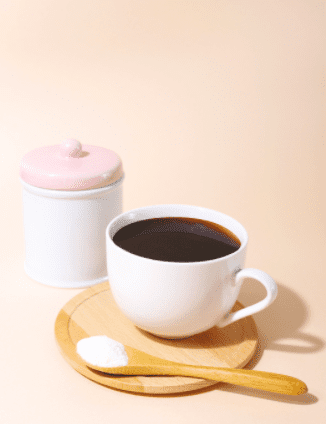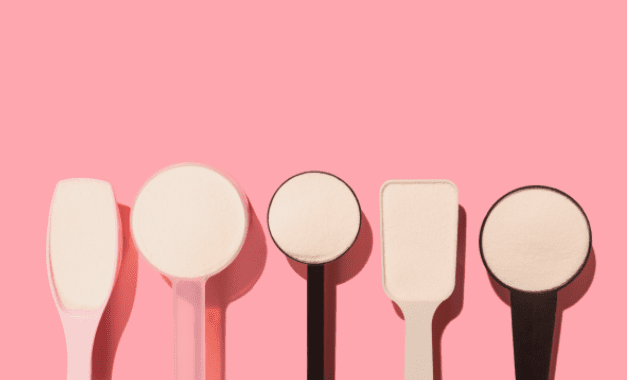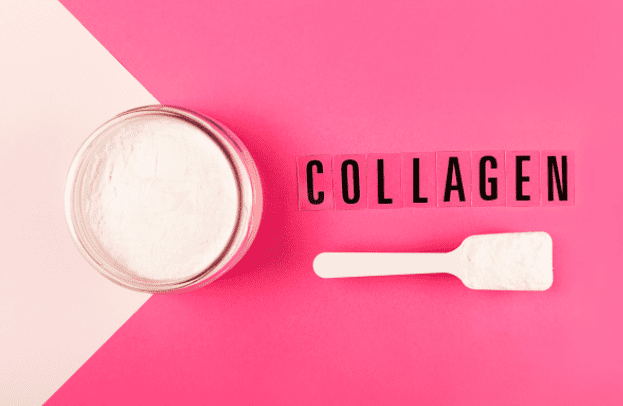Hands up if you take collagen supplements? Yup, it’s pretty much all of us. But as criticisms of powders and pills linger, do we know what we’re actually consuming – and are we just being fooled by powerful social media marketing? Capsule investigates the ever-evolving world of collagen
When was the last time you opened Instagram and didn’t see an influencer hawking some kind of collagen powder?
In the beauty industry’s war for your money, definitive battle lines have been drawn and the competition is fierce. The brands on the battlefield are no longer just names of different companies: they stand for so much more. A lifestyle. A badge of honour. A declaration of loyalty to the influencer-in-chief who rewards their soldiers with their affiliate codes.
Collagen supplements are a huge industry, with big brands such as Dose & Co, Two Islands, Jeuneora, Adashiko, and Be Pure leading the way. In particular, collagen powders are now some kind of weird status symbol, comparable to the ‘What kind of car do you drive?’ or ‘What model iPhone do you have’ – or if you’re in Christchurch, ‘What school did you go to?’
The container you have artfully placed next to your Nespresso and Nutribullet is as much home décor as your Kmart copper fruit bowls and stack of coffee table books you’ve never read.
By selecting one or the other (whether you want to you’re not) you’re aligning yourself with a powder posse, if you will. A few years ago, shit started to get real when wellness personalities and sisters Julia and Libby Matthews founded Two Islands, but then went their separate ways with Libby going on to found Dose & Co.
Other brands have too made their mark in the saturated market, and all of them reckon, obviously, that theirs is the best.
Some are marketed as ‘premium’, others focus on affordability. Some have other stuff, like protein and vitamins, added, and others have different flavouring.
And then, there’s what the stuff is actually made of – pigs, cows or fish (or bovine, porcine and marine, if you’re fancy.)
But there is criticism that collagen supplements – especially powders – do little in the way of improving overall health, either internally or externally.
“Ten years ago, there was a fish oil boom. In preliminary studies, there was a signal with fish oil and cardiovascular health, that it could lower risks of heart attacks. Early studies showed a trend, but when they did larger scale studies, they found there was no benefit,” dermatologist Dr Adrian Lim told Australian lifestyle Mamamia in 2020.
“So I think right now, there’s a lot of excitement around collagen drinks, but the data is just not quite there.”

What exactly is it?
So, what actually is collagen and why do we all of a sudden need it? We asked Capsule’s default nutritionist, naturopath and herbal medicine expect (default because we all individually see her because she’s a MIRACLE worker) Annaliese Jones for her professional opinion.
“There’s no disputing how important collagen is,” she begins.
“It’s a building block of our body, and it’s basically just protein. It’s amino acids kind of clinging together to make chain peptides, which then makes the collagen.”
Essentially, think of collagen as kind of like a glue that holds our bodies together, and as we get older, the glue breaks down faster. Of course it does.
We produce collagen naturally but as the years creep up on us, we get worse at making it ourselves – which is where supplements come in.
It’s a bloody minefield to try and figure it out – blogger and founder of Two Birds Beauty Jessie Gurunathan wrote a great story about the pros and cons of some of the biggest brands. For clarity’s sake she does declare that she took up a six-month ambassadorship with Dose & Co, but her research is sound.
As you’ll see from her table, there’s a massive difference in how much collagen you’re actually getting per serve depending on what brand you’ve gone with, as well as what type of collagen you’re consuming (Dose & Co are both the cheapest and have the most collagen per serve, while Jeuneora is the most expensive, and Adashiko contains the least collagen).


But do we actually need it?
But do we actually even need the stuff sullying our morning coffees, or are we just buying into Insta-hype?
Disclaimer here: Some of us at Capsule have used collagen products before and yup, we personally reckon there’s some benefit for things like nails, hair and skin. But did we buy it just because everyone else did and figured, why the hell not? Also a big yes.
As for the actual professional Annaliese, it boils down to the fact that yup, supplements can work, and if it does work for you, that’s great. But you can get collagen naturally in your diet anyway, and people should know if they’re actually collagen deficient before buying products – and not just because Instagram tells you to.
“The newfound fame collagen has is great,” she begins.
“Everyone is their own little doctor these days. Of course there’s a downside to that, but I think there’s a really positive side as well, because we’re all putting a lot more emphasis on our health.
“Collagen is one of those things that so many people have self-diagnosed that they need. But there are two camps – people taking it as a beauty supplement, and people who use it for gut health and joints.”
However, Anneliese does say that we are more likely to be collagen deficient than our mothers and grandmothers. “In the old days, your grandmother would have had a bone on the boil at all times, and bones were never wasted. People ate the skin of a lot of meat. That’s how they’d get the nutrients – including collagen. Over the last 100 years or so, we have stopped getting as much collagen in the diet as we used to.”
“But is it as good as making your own bone broth? That’s the question,” she asks. “When I sit down with a client and they say I’m taking it but it’s super expensive, I’ll say – ok, well how do you feel about once a week cooking a chicken, and then making a broth?
“Some people are really addicted to the idea of it making them look younger and having less wrinkles – that’s not all about collagen!”
Is there a difference in effect between the different types? In Annaliese’s clinical experience, both bovine and marine have had the same effectiveness. While she doesn’t stock collagen herself, she has recommended it for people suffering from stress-induced alopecia, hair loss, joint pain or gut issues.
“I’m thinking of two of my ladies who had breast cancer, who had rubbish guts because of the chemo and have never been the same since. They had really good effects with collagen – but some not so much, so maybe they’re not deficient in collagen.
“But I implore everyone – gently! – to start eating it in their diet, because I do believe that it will be more effective.


Beauty v health
While most collagen brands do market themselves as a beauty supplement first and foremost, with a particular focus on hair, skin and nails, others are trying to highlight their health benefits, such as Kiwi company Be Pure, who until entering the collagen market, were known for vitamins and other supplements.
Founder Ben Warren says the benefits for conditions such as joint pain, osteoporosis, insulin resistance and blood sugar levels are great, and markets his products as a “complete skin inflammation support product.”
“The initial research around collagen was from a beauty aspect, and then when the research came through about the health benefits, we started looking into it,” he says.
The trick with any collagen powder is a process called hydroxylation, where the collagen is broken down into smaller and easier to process particles [also called collagen peptides]. A big criticism of collagen powders originated from a time where collagen was sold without being hydrolysed, and would pass through the body without being absorbed. Essentially, you were literally pissing your money away.
“It would come out as a kind of white string,” says Ben. “And 13 or 14 years ago, I would have been in that camp [that thought collagen was a waste of time] because it wasn’t hydrolyzed. But now, it’s changed it all.”
Be Pure use sustainably sourced marine Type 1 collagen – Type 1 being the collagen that is most prevalent in the human body, and has 10g of collagen per serve, one of the highest on the market.
Competitor Jeuneora however firmly focuses on beauty.
“We find people aren’t as interested in [the health benefits] as they are the beauty benefits,” say director Colleen Itterman and CEO and founder Monique Kaminksi.
“It’s why we use the marine collagen we use, from fish skin, as it’s been scientifically researched specifically for beauty-boosting benefits.”
Now, all brands have multiple wellness products that claim to do slightly different things – gut health, beauty boosters, creamers. There’s vegan options, dairy-free options, pills, powders and elixirs.
All of the hype
As Colleen and Monique point out, collagen supplements have been a big thing internationally for years, with New Zealanders only really taking notice in the last five or six. Why the interest, all of a sudden?
Short answer – social media. Let’s go back to the beginning, when the original players in the market Jeuneora and Adashiko were the two biggest brands in Aotearoa.
Both brands have operated slick social media marketing campaigns, using very high profile influencers.
So it goes, when one individual brand gets noticed, others do too. Two Islands began working with local influencers as well, and Dose & Co signed Khloe Kardashian as a partner.
Now, it’s hard to not see an endorsement for collagen powders on social media. It’s not necessarily a bad thing, but it does make a consumer’s choice pretty difficult, especially if the default answer is, ‘I’ll just go with who I like the most’s recommendation’. In the popularity content that is influencer culture, things get a little murkier when the product being promoted is to do with health and wellness.
And, there are also questions we need to ask.


The dark side
In the same blog post where she compared four different collagen brands, Jessie also spoke of her experiences working with a particular brand, and being made to feel “like a token BIPOC influencer”.
In an Instagram story last week, the blogger replied to a follower’s question, asking if she still worked with Dose & Co.
She replied “no”, alleging that after she published the above blog post, she was on the receiving end of “full on racial gaslighting and aggressive bullying” from the company in question and people that have invested in them. [Jessie was messaged for comment on this story].
Questions were also raised around Dose & Co’s decision to partner with Khloe Kardashian. While the coup is impressive for a Kiwi business and should be roundly congratulated, the fact remains the company’s now very public face is known for wearing fake hair, fake nails and having access to the world’s best skincare and dermatologists.
And, as we’ve mentioned, not all collagens are created equal, with massively different degrees of collagen, vitamins and minerals present in formulas.
But one of the issues with collagen supplements is accessibility, says Annaliese.
“All of the stories that come out about collagen are overwhelmingly positive, but I think we’re forgetting as well that it’s us privileged people with high incomes that can afford these supplements. That’s why it’s important to remember it can be sourced naturally too.”


The bottom line
Yup, collagen supplements do seem to work for a lot of people – but they’re not going to be a silver bullet for your beauty or health concerns. If you want to take collagen supplements, take them. But before you enter the fray yourself, ask a few things first.
1. Do I need it? (Check with your doctor or other medical professional first, to see if you are collagen deficient).
2. Can I/ do I want to get it naturally?
3. What type of collagen do I want to take? Porcine, marine or bovine? And is it sourced according to my personal ethical standards?
4. Does the company’s ethos and value set align with mine?
Food – or powder – for thought. Good luck on the battlefield.
None of the above should in any way replace any professional medical advice. Always speak to your GP before taking any supplements.

